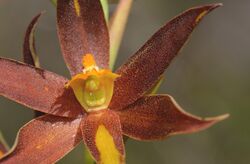Biology:Thelymitra magnifica
| Crystal Brook sun orchid | |
|---|---|

| |
| Thelymitra magnifica growing near Lesmurdie | |
| Scientific classification Error creating thumbnail: Unable to save thumbnail to destination
| |
| Kingdom: | Plantae |
| Clade: | Tracheophytes |
| Clade: | Angiosperms |
| Clade: | Monocots |
| Order: | Asparagales |
| Family: | Orchidaceae |
| Subfamily: | Orchidoideae |
| Tribe: | Diurideae |
| Genus: | Thelymitra |
| Species: | T. magnifica
|
| Binomial name | |
| Thelymitra magnifica Jeanes[1]
| |
Thelymitra magnifica, commonly called the Crystal Brook sun orchid,[2] is a species of orchid in the family Orchidaceae and is endemic to a small area in the south-west of Western Australia. It has a single erect, flat, leathery leaf and up to eight crowded, dark golden brown flowers with yellow streaks and blotches. The column has broad, deeply fringed, yellow or brownish wings.
Description
Thelymitra magnifica is a tuberous, perennial herb with a single erect, flat, leathery, lance-shaped to egg-shaped leaf 50–150 mm (2–6 in) long and 20–30 mm (0.8–1 in) wide. Between two and eight dark golden brown flowers with yellow streaks and blotches, 25–40 mm (1–2 in) wide are crowded on a flowering stem 150–300 mm (6–10 in) tall. The sepals and petals are 12–20 mm (0.5–0.8 in) long and 5–7 mm (0.2–0.3 in) wide. The labellum (the lowest petal) is narrower than the other petals and sepals. The column is golden brown near its base, yellow towards the tip, 5–7 mm (0.2–0.3 in) long, 3–4 mm (0.12–0.16 in) wide and has broadly spreading, widely fringed wings and glands on its back. The lobe on the top of the anther has a short lobe on its top. The flowers are insect pollinated and open on sunny days. Flowering occurs in September and October.[2][3][4][5]
Taxonomy and naming
Thelymitra magnifica was first formally described in 2006 by Jeff Jeanes from a specimen collected near Crystal Brook and the description was published in Muelleria.[6][5] The specific epithet (magnifica) is derived from the Latin words fuscus meaning "noble", "eminent" or "splendid",[7]:149 alluding to the flowers of this orchid.[3]
Distribution and habitat
The Crystal Brook sun orchid grows with wandoo trees on escarpment slopes between Gooseberry Hill and Armadale in the Jarrah Forest and Swan Coastal Plain biogeographic regions.[2][3][8]
Conservation
Thelymitra magnifica is classified as "Priority One" by the Government of Western Australia Department of Parks and Wildlife[8] meaning that it is known from only one or a few locations which are potentially at risk.[9]
References
- ↑ "Thelymitra magnifica". World Checklist of Selected Plant Families (WCSP). Royal Botanic Gardens, Kew. http://wcsp.science.kew.org/namedetail.do?name_id=348650.
- ↑ 2.0 2.1 2.2 Jones, David L. (2006). A complete guide to native orchids of Australia including the island territories. Frenchs Forest, N.S.W.: New Holland. p. 252. ISBN 1877069124.
- ↑ 3.0 3.1 3.2 Brown, Andrew; Dundas, Pat; Dixon, Kingsley; Hopper, Stephen (2008). Orchids of Western Australia. Crawley, Western Australia: University of Western Australia Press. p. 420. ISBN 9780980296457.
- ↑ Hoffman, Noel; Brown, Andrew (2011). Orchids of South-West Australia. (3rd ed.). Gooseberry Hill: Noel Hoffman. p. 291. ISBN 9780646562322.
- ↑ 5.0 5.1 Jeanes, Jeffrey (2006). "Resolution of the Thelymitra fuscolutea R. Br. (Orchidaceae) complex of southern Australia". Muelleria 24: 15–17. https://www.rbg.vic.gov.au/documents/Muelleria_24_p3-24_Jones_Thelymitra_fuscolutea_web_version.pdf. Retrieved 28 May 2018.
- ↑ "Thelymitra magnifica". APNI. https://id.biodiversity.org.au/instance/apni/613164. Retrieved 6 June 2018.
- ↑ Brown, Roland Wilbur (1956). The Composition of Scientific Words. Washington, D.C.: Smithsonian Institution Press. p. 504.
- ↑ 8.0 8.1 "Thelymitra magnifica". FloraBase. Western Australian Government Department of Parks and Wildlife. https://florabase.dpaw.wa.gov.au/browse/profile/20729.
- ↑ "Conservation codes for Western Australian Flora and Fauna". Government of Western Australia Department of Parks and Wildlife. http://www.dpaw.wa.gov.au/images/documents/plants-animals/threatened-species/Listings/conservation_code_definitions.pdf. Retrieved 6 June 2018.
External links
Wikidata ☰ Q15467992 entry
 |


